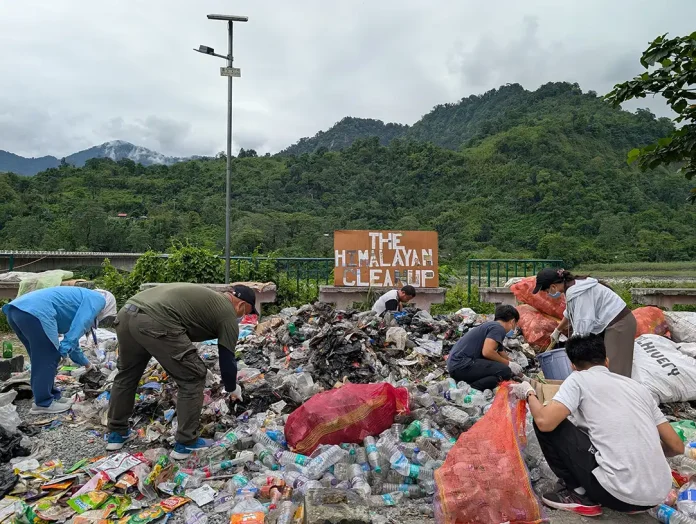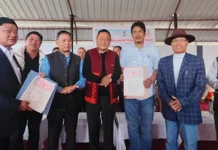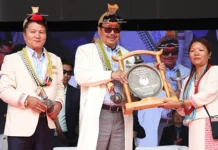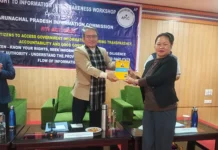ITANAGAR, 9 Aug: PepsiCo, Coco-Cola, Kaisha Industries, Natural Water Industries, Parle, Vinayaka Industries, Hornbill Industries, ITC, CG Foods, and Perfetti Van Melle were revealed as the top 10 polluters of the Indian Himalayan region for 2025 at a webinar themed ‘The Himalayan Cleanup Speaks: Insights to Action’, held on Friday, the Zero Waste Himalaya Day.
Along with the top 10 polluters, Nimoj Industries, Parshuram Packaged Drinking Water, Nestle, Fresho Beverages, Linggi Lehmo Beverages, Haldirams, Pran, Dabur, Mondelez, and Reliance were found in the top 20 companies polluting the Indian Himalayan region. While the top global and national brands have continued their presence as top polluters, THC-2025 showed a big jump of local brands and bottled water brands.
The top polluters were identified through The Himalayan Cleanup (THC) audits, which were conducted across eight mountain states, with 12,500 volunteers cleaning up 148 sites and auditing 2,17,854 plastic waste.
Zero Waste Himalaya and the Integrated Mountain Initiative have been anchoring THC since 2018, with a waste and brand audit to name the companies that pollute the Himalayas, and to call them out to take responsibility for their plastic waste.
The webinar highlighted that existing policies and practices are not sensitive and sufficient to respond to the Himalayan waste crisis, and that there is a need to acknowledge the socio-ecological importance, fragility and challenges of the Himalayas. The need to shift the solution narrative beyond the broom, bin, landfill, burn and roll it downhill and towards systemic solutions was stressed.
Zero Waste Himalaya member Priya Shresthahighlighted that 2,17,854 plastic waste collected was 93% of the total waste collected. Forty-seven percent of the plastic waste collected was non-recyclable, thus challenging recycling as a complete solution. There has been a dramatic reduction in the non-recyclable plastic collected during THC-2025,compared to the past six years. Fifty-three percent of plastic waste collected was recyclable.
Food packaging was consistently the highest trashed item at 93% of all plastics, which shows the continued trend in the consumption of junk ultra-processed food and the contribution of Big Food to the Himalayan waste crisis. Fifty-two percent of food packaging audited was non-recyclable, which highlights the limitations of recycling as a solution. Forty-seven point five percent of the food packaging was beverage bottles and 11% of it was the energy drink ‘Sting’, which has seen high consumption among students.
While Sting still topped the list, THC-2025 showed an increase in the number of other energy drinks. The food and waste intersect was highlighted as very concerning for mountain communities, as there is clear evidence showing that junk ultra-processed food and beverage are the leading cause of non-communicable diseases and contribute to mental ill-health.
RK Paul Chawang of NGO Amyaa in Arunachal Pradesh; Shirshendu S Das of Midway Journey,Assam; Kamlesh Rai of Biruwa, Darjeeling/Kalimpong; Abdul Rashid Bhatt from Kashmir University, Jammu & Kashmir; Preeti Chauhan of Little Green World, Leh, Ladakh; Yoyung Shaiza of Enfogal, Manipur; Subhashish Dasgupta of MIMDI, Meghalaya; Mery Chakma of Mizoram Waste Solutions, Mizoram; Niksungla of Living for Environment, Nagaland; and Tshering Uden Bhutia of KCC, Sikkim shared their insights across the Indian Himalayan region, anchoring the THC-2025 in their respective states and regions.
Representatives of GAIA and Break Free from Plastic responded to the THC results and insights,bringing in national, South Asian and global perspectives. Curb on production, and systemic changes that also ensure a just transition, was shared and put into perspective with global negotiations that are underway to end plastic pollution.
Jigme Bhutia, MD of SBM (Sikilkim) said that THC had been instrumental in informing local waste management strategies, and expressed hope that the demand of the EPR would lead to meaningful outcomes.
IMI president Ramesh Negi reiterated the Himalayan agenda and called out the need for mountain sensitive policies and allocation of adequate resources. He called for a development paradigm for the Himalayasthat is not extractive and polluting, and congratulated the organisers and volunteers of THC for their stewardship.





